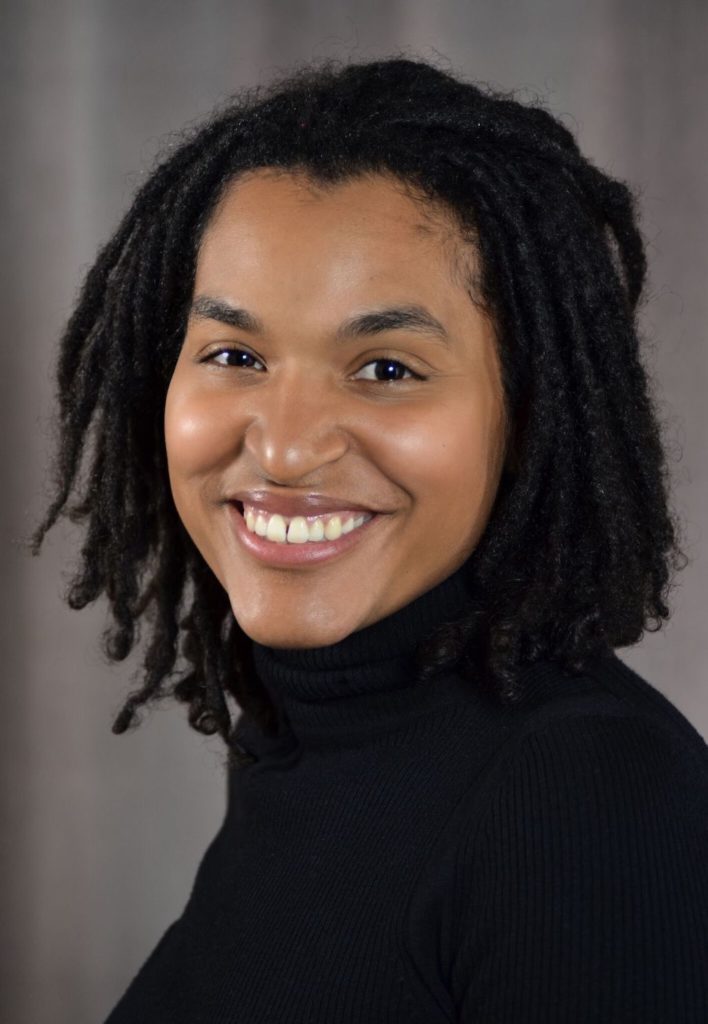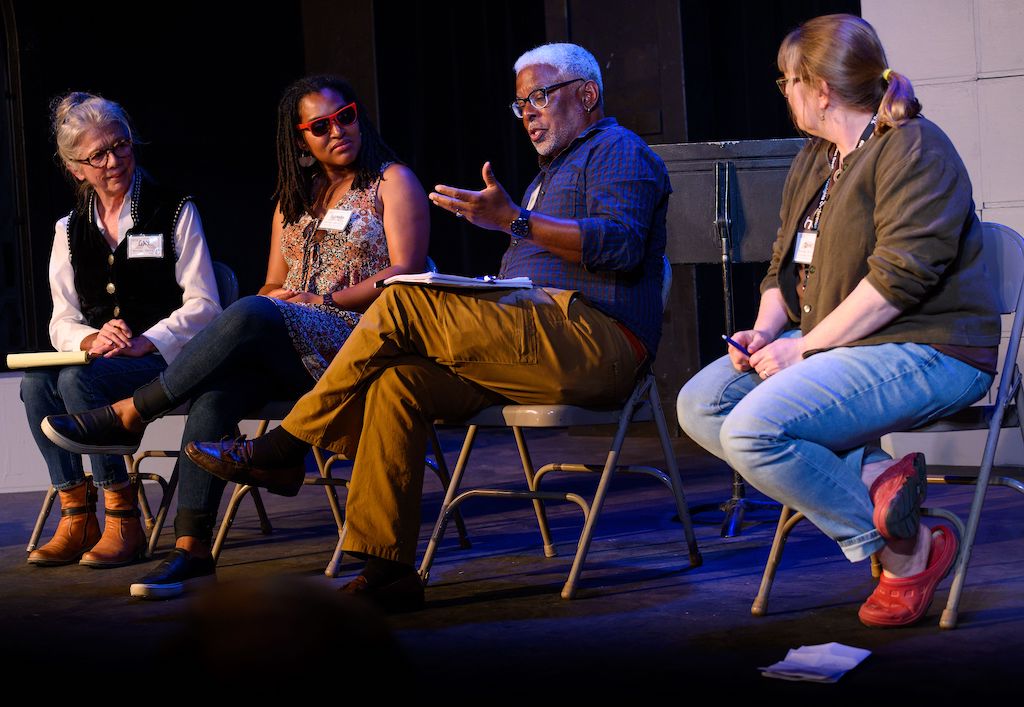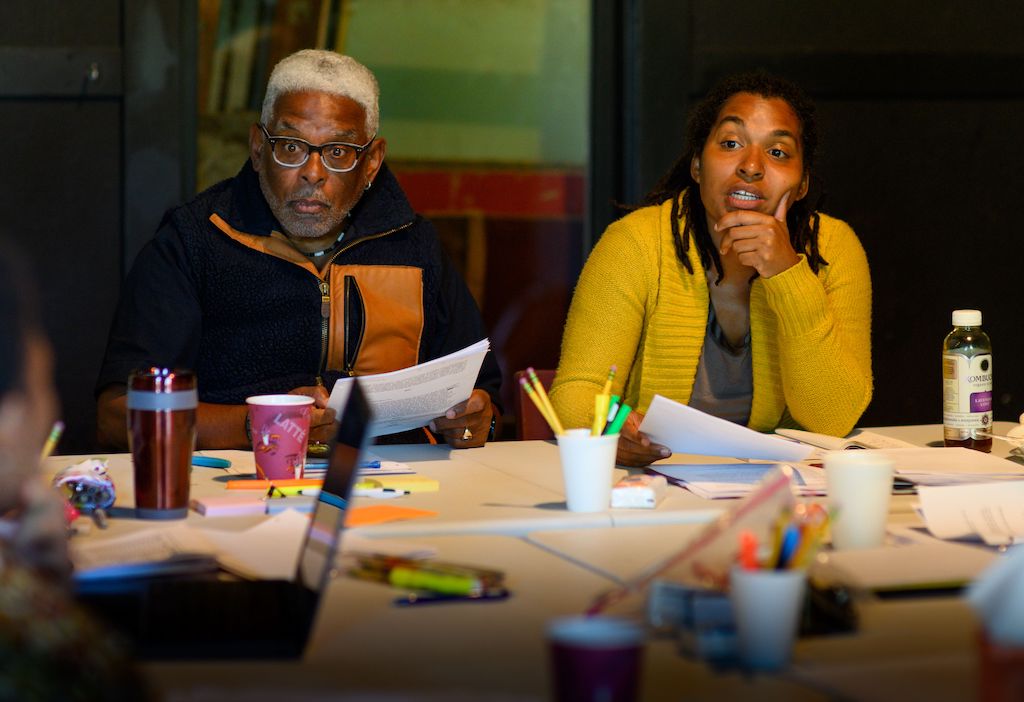South Philly’s Theatre Exile goes beyond all things Off-Passyunk Avenue this Monday, June 29 at 7 p.m. with the virtual world premier of “Homeridae” from playwright Alexandra Espinoza, and director Nikki Brake-Sillá with local actors Anita Holland, Ang Bey, Lindsay Smiling, Brandon Pierce, Carlo Campbell, and Destinee Gines. Starting with the concept that “Homeridae is a play about who controls the narrative, and finding your voice when no one is listening,” Espinoza’s drama takes place within a college campus where adjunct lecturer Mac and freshman student Nessa – African Americans in a white academic department at white university – share a love of Homer’s “The Odyssey.” Discovering that Homer himself came from Africa, the duo finds a way to honor this truth in the face of university administrators, overbearing older siblings, the Internet, and Homer himself.
I caught up with Espinoza – a member of the Foundry at PlayPenn, and Azuka Theatre’s New Pages with dramaturgy and directing credits at Simpatico Theatre, the National Constitution Center and Inis Nua Theatre – at home during C-19 Code Yellow.

A.D. Amorosi: What were the circumstances under which you first wrote/began to write “Homeridae”?
Alexandra Espinoza: I began writing “Homeridae” in 2017 when I was a first-year Masters student in Theatre at Villanova. I began writing the play as an assignment for my playwriting class with Michael Hollinger. Our first assignment was to think of 20 ideas for a play and to write a few pages of dialogue for our favorite ideas. One of those ideas was a play about a Black academic in a very white department. Writing a few pages of dialogue between the character who became Mac and a living, breathing representation of Homer seemed like the most fun and most dynamic way to get started, and I went from there.
A.D. Amorosi: How would you say it has most changed since that start?
Alexandra Espinoza: I finished the first draft of the play shortly before the Unite the Right rally in Charlottesville, Virginia that resulted in racist violence and the violent death of a protestor. The racist rhetoric and violence that took place, all in defense of Confederate monuments, made me realize there was an urgency to create stories that show the full spectrum of violence that Black Americans experience on college campuses, from microaggressions to blackface, to physical violence. I also had a play draft with a living, breathing statue in it, and took that as an opportunity to offer a more active commentary on history and narrative and how those dynamics intersect with white supremacy culture. That is the draft of Homeridae that has continued to grow and tighten over the last couple of years as I have continued to workshop and develop it.
A.D. Amorosi: Has Covid-19 shifted anything about Homeridae?
Alexandra Espinoza: To be honest, Covid-19 has not changed the play’s trajectory in any way that I am aware of. Before the pandemic began, I felt the play was ready to be produced and I had been hitting the pavement applying to opportunities and advocating for the play here in Philly, all while being a Black, Latinx, Femme, Queer, Radical Human working in an industry with severe structural inequities when it comes to who has the power to produce and make decisions about what stories audiences experience. What I have done for this play since the pandemic began is no different, but with the added baggage of being in a situation where even the most powerful in the industry are paralyzed by the uncertainty of the future.
A.D. Amorosi: How did the currency of BLM and the George Floyd video change/shift/emphasize the narrative of African Americans in a very white academic department at a very white school vibe, and what it means?
Alexandra Espinoza: This play is, and always was intended, to contribute to conversations around Black Liberation. I have intimate experiences with being a Black person in academia, and so that is what I wrote about, but the struggles my characters experience live on a continuum with the violence against Black bodies that Black Lives Matter and other organizations are courageously responding to in the wake of Mr. George Floyd’s murder at the hands of the police. I know that the murders of George Floyd, Breonna Taylor, and Ahmaud Arbery, among many others have changed me irrevocably as a person. The murders of Philando Castile, Michael Brown, Tamir Rice, Sandra Bland, and Trayvon Martin, and countless others, also changed me as a person. The Unite the Right Rally and subsequent massacre also changed me as a person. And because of timing, it changed this play. I don’t know how this current moment in the fight for Black Lives will change this play. That is part of what I will be listening for on Monday night.
A.D. Amorosi: How do you think that a virtual performance of Homeridae will feel?
Alexandra Espinoza: Since this is a reading of Homeridae and not a full production, very little has changed to make it virtual aside from none of us being in the same room. I will certainly miss being able to get a sense of how the audience is responding to the piece without access to body language, people’s attention spans, laughter, groans, and the general temperature of the room. I am looking forward to the talkback session afterward because it may help in painting that picture.

A.D. Amorosi: What does Theatre Exile bring to the party?
Alexandra Espinoza: Theatre Exile selected Homeridae for its annual reading series. I had been an actor in a reading there before and had spoken to Deborah Block (Producing AD) about my work as a playwright so I sent the script over and found out they had selected it on March 12, the same day Philly theatres started to shut down rehearsals and productions. Deb and Brey have been wonderfully flexible as we have had to respond to all the twists and turns of the moment to make decisions about the process. They have also hired an excellent director who I trust implicitly with my work, Nikki Brake-Silla, and a dynamite cast, who make it so easy and joyful to do the work of nit-picky rewrites because I trust they will tell me what feels right for the character from the inside out. What Theatre Exile has not done, nor has any producing theatre here in Philadelphia, is express an interest in producing the play for the stage. The play features an all Black cast and has received enough development at this point that I as the playwright can’t learn much more about what the play needs until it is fully on its feet for a world premiere production. In the meantime, I’m thrilled to get to share the story with an audience on Monday, especially in a time of isolation where there is a hunger for connection and solidarity
Check out the Theatre Exile site, for info and reading times.
Images: Sarah Jessup.
About Post Author
Discover more from dosage MAGAZINE
Subscribe to get the latest posts sent to your email.


